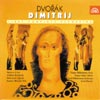Dvorák Dimitrij
Where Boris left off…a welcome back to this full-blooded Dvovák opera
View record and artist detailsRecord and Artist Details
Composer or Director: Antonín Dvořák
Genre:
Opera
Label: Supraphon
Magazine Review Date: 3/2005
Media Format: CD or Download
Media Runtime: 191
Mastering:
Stereo
DDD
Catalogue Number: SU3793-2

Tracks:
| Composition | Artist Credit |
|---|---|
| Dimitrij |
Antonín Dvořák, Composer
Antonín Dvořák, Composer Czech Philharmonic Orchestra Drahomira Drobková, Marfa Ivanovna, Contralto (Female alto) Gerd Albrecht, Conductor Ivan Kusnjer, Prince Shuisky Leo Marian Vodicka, Dimitri Ivanovich Lívia Ághová, Xenia Borisnova, Soprano Ludek Vele, Iov, Bass Magdaléna Hajóssyová, Marina Mnishkova, Soprano Peter Mikulás, Pyotr Fyodorovich Basmanov, Baritone Prague Philharmonic Choir Prague Radio Chorus |
Author: Edward Greenfield
It is good to have this first (and so far only) complete recording of Dvovák’s ambitious opera back in the catalogue. It carries on the story of Boris Godunov after the Tsar’s death, and four of the principal characters are the same as in Mussorgsky’s opera: the Polish Princess Marina, Boris’s daughter, Xenia, Prince Shuisky and Dimitri. The big difference is that this Dimitri believes in his right to claim the throne as the son of Ivan the Terrible, unaware that the real Dimitri has been murdered, where in Boris he is an unashamed Pretender. It puts a completely different slant on his character, a noble figure tragically revealed as a sham when Marfa is forced belatedly to admit he is not her son.
As John Warrack said in his original review, this is a fine recording, idiomatically conducted by Gerd Albrecht, with the Prague choirs making the most of the many ensembles, not least the double choruses representing the conflicting Polish and Russian forces. As has been pointed out, Dvovák was less influenced by the rugged example of Mussorgsky than by the grand operas written for Paris by Meyerbeer. Probably anxious to attract international audiences, he tends to resist a full-blooded Slavonic idiom, though the roistering Poles echo Slavonic dances and many of the melodies given to the three women principals have an attractive, gentle Czech flavour. The final chorus also brings reminders of Slavonic church music.
Though it can hardly compare with Boris, it defies the idea that Dvovák was not an opera composer. The confrontation between Dimitri and his rejected wife, Marina, in Act 3 is powerful, as is the final, hesitant admission of Marfa in Act 4 that Dimitri is not her son.
In the title role, Leo Marian Vodicka is a powerful, Slavonic-sounding tenor, singing sensitively if at times with strain and some strangled top notes. Sweetest on the ear among the women is Lívia Ághová as Xenia, pure, fresh and precise in attack, not least in the lovely Act 2 aria leading to her big duet with Dimitri. As Marina, Magdaléna Hajóssyová is bright and fresh, flexible too, if with an occasional edge on the voice, and the contralto, Drahomira Drobková, is a warm, rich-toned Marfa. Good sound, and the singers’ diction is admirably clear.
As John Warrack said in his original review, this is a fine recording, idiomatically conducted by Gerd Albrecht, with the Prague choirs making the most of the many ensembles, not least the double choruses representing the conflicting Polish and Russian forces. As has been pointed out, Dvovák was less influenced by the rugged example of Mussorgsky than by the grand operas written for Paris by Meyerbeer. Probably anxious to attract international audiences, he tends to resist a full-blooded Slavonic idiom, though the roistering Poles echo Slavonic dances and many of the melodies given to the three women principals have an attractive, gentle Czech flavour. The final chorus also brings reminders of Slavonic church music.
Though it can hardly compare with Boris, it defies the idea that Dvovák was not an opera composer. The confrontation between Dimitri and his rejected wife, Marina, in Act 3 is powerful, as is the final, hesitant admission of Marfa in Act 4 that Dimitri is not her son.
In the title role, Leo Marian Vodicka is a powerful, Slavonic-sounding tenor, singing sensitively if at times with strain and some strangled top notes. Sweetest on the ear among the women is Lívia Ághová as Xenia, pure, fresh and precise in attack, not least in the lovely Act 2 aria leading to her big duet with Dimitri. As Marina, Magdaléna Hajóssyová is bright and fresh, flexible too, if with an occasional edge on the voice, and the contralto, Drahomira Drobková, is a warm, rich-toned Marfa. Good sound, and the singers’ diction is admirably clear.
Discover the world's largest classical music catalogue with Presto Music.

Gramophone Digital Club
- Digital Edition
- Digital Archive
- Reviews Database
- Full website access
From £8.75 / month
Subscribe
Gramophone Full Club
- Print Edition
- Digital Edition
- Digital Archive
- Reviews Database
- Full website access
From £11.00 / month
Subscribe
If you are a library, university or other organisation that would be interested in an institutional subscription to Gramophone please click here for further information.




